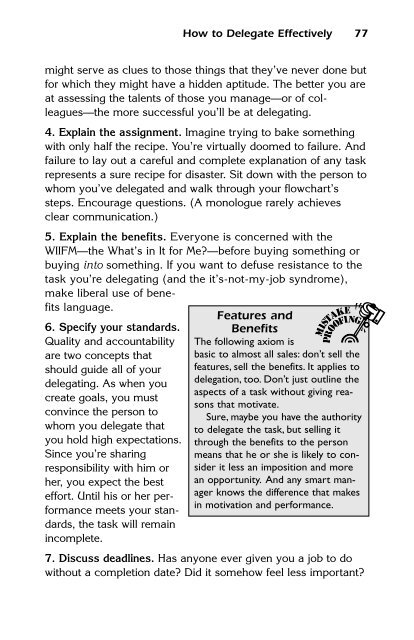Time Management - Marc Mancini
Create successful ePaper yourself
Turn your PDF publications into a flip-book with our unique Google optimized e-Paper software.
How to Delegate Effectively 77<br />
might serve as clues to those things that they’ve never done but<br />
for which they might have a hidden aptitude. The better you are<br />
at assessing the talents of those you manage—or of colleagues—the<br />
more successful you’ll be at delegating.<br />
4. Explain the assignment. Imagine trying to bake something<br />
with only half the recipe. You’re virtually doomed to failure. And<br />
failure to lay out a careful and complete explanation of any task<br />
represents a sure recipe for disaster. Sit down with the person to<br />
whom you’ve delegated and walk through your flowchart’s<br />
steps. Encourage questions. (A monologue rarely achieves<br />
clear communication.)<br />
5. Explain the benefits. Everyone is concerned with the<br />
WIIFM—the What’s in It for Me?—before buying something or<br />
buying into something. If you want to defuse resistance to the<br />
task you’re delegating (and the it’s-not-my-job syndrome),<br />
make liberal use of benefits<br />
language.<br />
6. Specify your standards.<br />
Quality and accountability<br />
are two concepts that<br />
should guide all of your<br />
delegating. As when you<br />
create goals, you must<br />
convince the person to<br />
whom you delegate that<br />
you hold high expectations.<br />
Since you’re sharing<br />
responsibility with him or<br />
her, you expect the best<br />
effort. Until his or her performance<br />
meets your standards,<br />
the task will remain<br />
incomplete.<br />
Features and<br />
Benefits<br />
The following axiom is<br />
basic to almost all sales: don’t sell the<br />
features, sell the benefits. It applies to<br />
delegation, too. Don’t just outline the<br />
aspects of a task without giving reasons<br />
that motivate.<br />
Sure, maybe you have the authority<br />
to delegate the task, but selling it<br />
through the benefits to the person<br />
means that he or she is likely to consider<br />
it less an imposition and more<br />
an opportunity. And any smart manager<br />
knows the difference that makes<br />
in motivation and performance.<br />
7. Discuss deadlines. Has anyone ever given you a job to do<br />
without a completion date? Did it somehow feel less important?

















